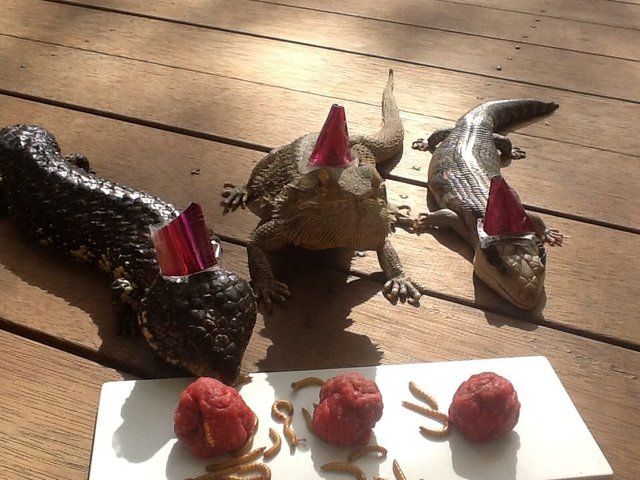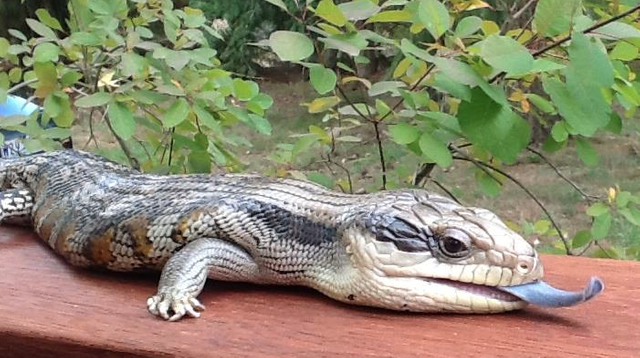How to care for a pet lizard and what to expect.
Lizards can make awesome pets, they're a bit exotic, they come in many different species and they make a cool little companion to hang out with.
If you're thinking of getting a pet lizard there's a few things you should know before you head to a reptile store or hop online and start browsing.

A shingleback a Bearded Dragon and a Bluetongue enjoying some fresh mince
They aren't "low maintenance"
A lot of people seem to think that lizards, along with other reptiles, are quite low maintenance and easy to look after. While they are easy to look after they still require all the same things your other pets do like affection and attention.
They aren't meant to be put into an enclosure and just given food and water they need stimulation, to explore and exercise.

Lizards don't tend to drink a lot but you should always ensure they have access to clean water. Make sure the water dish isn't too deep so as you're new friend can't drown in it.
When it comes to feeding it's really going to depend on the type of lizard you have. Here in Australia most are omnivores and their diets consist mostly of vegetables and fruits. A typical adult will need to be fed every second day ensuring any uneaten food is removed at the end of the day. A baby or young lizard will eat once a day.

They also love some meat and most will happily chomp down meal-worms or garden snails. Try not to feed them processed crap like cat and dog food which can be popular, occasionally we will give ours some fresh mince but otherwise insects and bugs are the go.
They require UVB light
Certain reptiles require what's known as UVB light. UBV light is Ultraviolet light with a wavelength between 280-320 nm. This wavelength range is critical for absorbing vitamin D3 and if the animal has no access to it can develop debilitating diseases like MBD or Metabolic Bone Disease.
You will need to provide a heat source as well as the light as most don't create enough ambient heat to adequately warm your enclosure but you can test that with a handheld thermometer.

Most lizards, tortoises and crocodiles all require UVB light while snakes and aquatic turtles can obtain this crucial vitamin in their food.
If your lizard lives in a glass tank then you will need to make sure the light is on the inside of the glass but not positioned so it could fall and injure your pet. UVB light will not penetrate glass so even if the enclosure gets good sunlight it wont be sufficient.
If you want them to be friendly you have to handle them.
Like most animals lizards will require socialisation to get them used to you and other people. If you want to handle your little buddy and have them hang out with you and not be scared everytime you go to touch them you need to handle them often.

Lizzy the Bluetongue having some lap time
Aside from helping with socialising they also need to get out and explore different areas. Stimulation is an important part of keeping a happy lizard, we have a modified rabbit hutch outside that we put ours in for a good few hours on nice days.

You should also include stimulation within their environment including logs and rocks to climb around/hide under, plants and vines (always ensure anything you put in your tank isn't poisonous.)
When you pick them up put one hand under the body and front legs and one behind the tail and under the back legs, they like to be supported and it helps to stop them jumping out of your hand if they get frightened.
Finding a vet will not be easy.
Most reptiles seem to be pretty hearty animals and illness and injury doesn't occur often, however if you start to notice something wrong with your lizard eg, bone deformation, lethargy or they happen to hurt themselves they will need veterinary assistance.
Most vets will be able to administer medication or treat superficial injuries but finding a vet that has an in-depth knowledge of lizards will not be easy, or cheap.

Did you know a group of lizards is called a lounge
Some things can be treated by simple antibiotics, others may require a change to their environment or diet. Either way it's an expense you always need to be wary of with animals and lizards can make it even more challenging.
Just do your research.
No matter what animal you get as a pet you should always look into their care and needs beforehand. Each species will have different requirements and different needs, just like certain dog breeds need different things.
They make a great pet but it can be a decent investment in lighting, heat, enclosures, and replacement parts but generally food and upkeep is cheap, small pieces of chopped vegetables, mealworms, worms, snails. If you've never had a lizard before I'd recommend a bearded dragon, a bluetongue or a stumpy (Shingleback).

If you have any questions feel free to ask in the comments. I don't consider myself an expert by any means but I have been around reptiles and lizards for over 15 years now and soon will be undertaking a herpetology course.
Thanks for reading and hopefully someone found this useful :)
Lizards are so cute XD Friend had a thorny thing that she used to take out to her front yard and sit with while it sunned and its favourite place to sit was on her shoulder/boob XD
Yours look like they're partying up, what was the occasion? :)
I envy my little cousins. Must be nice not to have to wear a monkey suit and pretend to be dumb.